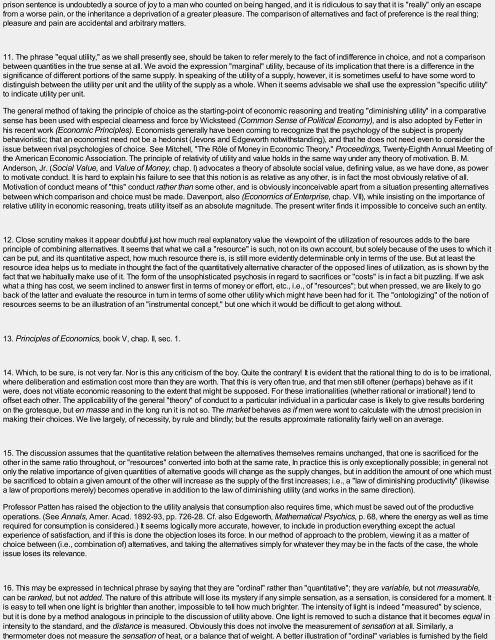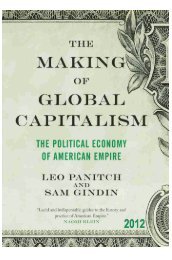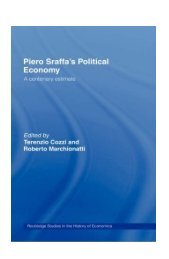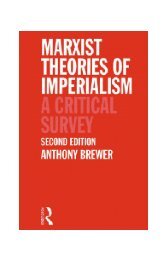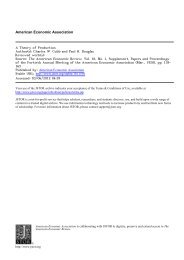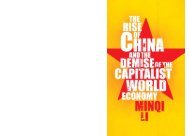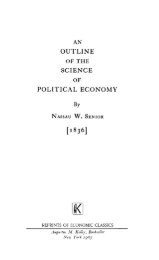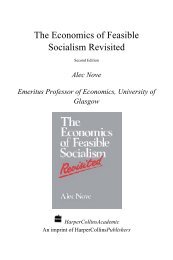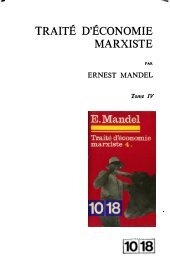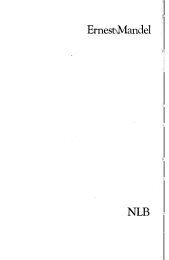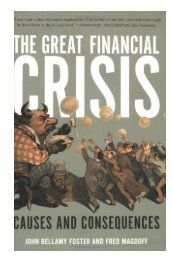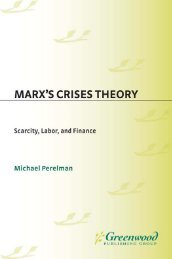prison sentence is undoubtedly a source of joy to a man who counted on being hanged, <strong>and</strong> it is ridiculous to say that it is "really" only an escapefrom a worse pain, or the inheritance a deprivation of a greater pleasure. The comparison of alternatives <strong>and</strong> fact of preference is the real thing;pleasure <strong>and</strong> pain are accidental <strong>and</strong> arbitrary matters.11. The phrase "equal utility," as we shall presently see, should be taken to refer merely to the fact of indifference in choice, <strong>and</strong> not a comparisonbetween quantities in the true sense at all. We avoid the expression "marginal" utility, because of its implication that there is a difference in thesignificance of different portions of the same supply. In speaking of the utility of a supply, however, it is sometimes useful to have some word todistinguish between the utility per unit <strong>and</strong> the utility of the supply as a whole. When it seems advisable we shall use the expression "specific utility"to indicate utility per unit.The general method of taking the principle of choice as the starting-point of economic reasoning <strong>and</strong> treating "diminishing utility" in a comparativesense has been used with especial clearness <strong>and</strong> force by Wicksteed (Common Sense of Political Economy), <strong>and</strong> is also adopted by Fetter inhis recent work (Economic Principles). Economists generally have been coming to recognize that the psychology of the subject is properlybehavioristic; that an economist need not be a hedonist (Jevons <strong>and</strong> Edgeworth notwithst<strong>and</strong>ing), <strong>and</strong> that he does not need even to consider theissue between rival psychologies of choice. See Mitchell, "The Rôle of Money in Economic Theory," Proceedings, Twenty-Eighth Annual Meeting ofthe American Economic Association. The principle of relativity of utility <strong>and</strong> value holds in the same way under any theory of motivation. B. M.Anderson, Jr. (Social Value, <strong>and</strong> Value of Money, chap. I) advocates a theory of absolute social value, defining value, as we have done, as powerto motivate conduct. It is hard to explain his failure to see that this notion is as relative as any other, is in fact the most obviously relative of all.Motivation of conduct means of "this" conduct rather than some other, <strong>and</strong> is obviously inconceivable apart from a situation presenting alternativesbetween which comparison <strong>and</strong> choice must be made. Davenport, also (Economics of Enterprise, chap. VII), while insisting on the importance ofrelative utility in economic reasoning, treats utility itself as an absolute magnitude. The present writer finds it impossible to conceive such an entity.12. Close scrutiny makes it appear doubtful just how much real explanatory value the viewpoint of the utilization of resources adds to the bareprinciple of combining alternatives. It seems that what we call a "resource" is such, not on its own account, but solely because of the uses to which itcan be put, <strong>and</strong> its quantitative aspect, how much resource there is, is still more evidently determinable only in terms of the use. But at least theresource idea helps us to mediate in thought the fact of the quantitatively alternative character of the opposed lines of utilization, as is shown by thefact that we habitually make use of it. The form of the unsophisticated psychosis in regard to sacrifices or "costs" is in fact a bit puzzling. If we askwhat a thing has cost, we seem inclined to answer first in terms of money or effort, etc., i.e., of "resources"; but when pressed, we are likely to goback of the latter <strong>and</strong> evaluate the resource in turn in terms of some other utility which might have been had for it. The "ontologizing" of the notion ofresources seems to be an illustration of an "instrumental concept," but one which it would be difficult to get along without.13. Principles of Economics, book V, chap. II, sec. 1.14. Which, to be sure, is not very far. Nor is this any criticism of the boy. Quite the contrary! It is evident that the rational thing to do is to be irrational,where deliberation <strong>and</strong> estimation cost more than they are worth. That this is very often true, <strong>and</strong> that men still oftener (perhaps) behave as if itwere, does not vitiate economic reasoning to the extent that might be supposed. For these irrationalities (whether rational or irrational!) tend tooffset each other. The applicability of the general "theory" of conduct to a particular individual in a particular case is likely to give results borderingon the grotesque, but en masse <strong>and</strong> in the long run it is not so. The market behaves as if men were wont to calculate with the utmost precision inmaking their choices. We live largely, of necessity, by rule <strong>and</strong> blindly; but the results approximate rationality fairly well on an average.15. The discussion assumes that the quantitative relation between the alternatives themselves remains unchanged, that one is sacrificed for theother in the same ratio throughout, or "resources" converted into both at the same rate, In practice this is only exceptionally possible; in general notonly the relative importance of given quantities of alternative goods will change as the supply changes, but in addition the amount of one which mustbe sacrificed to obtain a given amount of the other will increase as the supply of the first increases; i.e., a "law of diminishing productivity" (likewisea law of proportions merely) becomes operative in addition to the law of diminishing utility (<strong>and</strong> works in the same direction).Professor Patten has raised the objection to the utility analysis that consumption also requires time, which must be saved out of the productiveoperations. (See Annals, Amer. Acad. 1892-93, pp. 726-28. Cf. also Edgeworth, Mathematical Psychics, p. 68, where the energy as well as timerequired for consumption is considered.) It seems logically more accurate, however, to include in production everything except the actualexperience of satisfaction, <strong>and</strong> if this is done the objection loses its force. In our method of approach to the problem, viewing it as a matter ofchoice between (i.e., combination of) alternatives, <strong>and</strong> taking the alternatives simply for whatever they may be in the facts of the case, the wholeissue loses its relevance.16. This may be expressed in technical phrase by saying that they are "ordinal" rather than "quantitative"; they are variable, but not measurable,can be ranked, but not added. The nature of this attribute will lose its mystery if any simple sensation, as a sensation, is considered for a moment. Itis easy to tell when one light is brighter than another, impossible to tell how much brighter. The intensity of light is indeed "measured" by science,but it is done by a method analogous in principle to the discussion of utility above. One light is removed to such a distance that it becomes equal inintensity to the st<strong>and</strong>ard, <strong>and</strong> the distance is measured. Obviously this does not involve the measurement of sensation at all. Similarly, athermometer does not measure the sensation of heat, or a balance that of weight. A better illustration of "ordinal" variables is furnished by the field
of æsthetics (another form of "value," of course). We can tell that one poem or picture is better than another, but no one would seriously proposemeasuring the superiority. To be sure, in school <strong>and</strong> in contests we may go through the motion of "grading" such things (even deportment!) on apercentage scale, but no one whose opinion is entitled to respect attaches any particular weight to the results of this make-believe.17. That to a considerable extent purchases are based on momentary impulse <strong>and</strong> not on an estimation of relative long-time significance, is, ofcourse, true, <strong>and</strong> perhaps increasingly so with the development of the "anti-social" arts of window-dressing, display advertising, <strong>and</strong> salesmanship.This is one of the important "allowances" that has to be made in applying economic theory to actual fact, until the progress of the science reducesthe phenomena to general laws <strong>and</strong> incorporates them into the deductive system. (Cf. above, p. 52 [II.III.2-3—Ed.], <strong>and</strong> note; also p. 61, note.[II.III.17, nn8—Ed.]) Effects balance out to approximate rationality under the law of large numbers.18. The doctrine of the surplus is one of the few points where the writer is compelled to disagree with Marshall on a fundamental matter of doctrine.(See Principles, 6th ed., pp. 125-33, esp. p. 129, note.) The question relates to "scope <strong>and</strong> method," however, rather than to fact or logic. I simplycannot see any use for the notion in underst<strong>and</strong>ing human conduct or explaining economic phenomena, <strong>and</strong> am convinced that the confusion ofviewpoint which underlies putting it to the fore has led to serious error <strong>and</strong> the drawing of wholly irrelevant conclusions from economic reasoning.Moreover, an appeal to "unsophisticated common sense" seems to fail utterly to substantiate the existence of the phenomenon. A man might pay,say, a thous<strong>and</strong> dollars for the "first" loaf of bread (whichever one that is) rather than do without it, but it does not follow <strong>and</strong> is not true that when hegets it for a dime he gets $999.90 worth of free satisfaction. Various thinkers have perceived the mythical character of these alleged surpluses; it ishoped that the argument above will suggest the source of the error <strong>and</strong> so render it more easily identified <strong>and</strong> avoided.19. Pages 64, 65 [II.III.22-24—Ed.].20. Dependent members of the society must be completely dependent on some particular individual in it. The wants of any dependent person willthen operate only through wants on his behalf felt by his sponsor, <strong>and</strong> we need not consider them at all. We need simply regard the independentmembers of the society as having normal solicitudes in regard to families, etc., but each person enters into economic life on an absolute equalitywith others or not at all.The meaning of the above assumptions is not necessarily that they form a complete description of the people <strong>and</strong> their relations. This is but anemphatic way of saying that we here consider only their market behavior, which is assumed to conform to these specifications.21. It goes without saying that our imaginary society is "isolated." Every individual who has anything at all to do with it is in it <strong>and</strong> of it on a par withall the rest.22. We might characterize such a society as a "h<strong>and</strong>icraft" system in contrast with "enterprise," in which the operative has lost his responsiblestatus <strong>and</strong> lives, not by the production <strong>and</strong> sale of a commodity, but by the sale of productive services to an entrepreneur.23. We treat the entire stock as for sale without reserve. The dem<strong>and</strong>s of present owners for their own goods, which underlie any possiblereservation prices, are in fact no different from the dem<strong>and</strong> of other persons, <strong>and</strong> the situation as a whole is most truthfully <strong>and</strong> significantlyrepresented as given quantities of goods over against given dispositions to own them, since the question of whose disposition it is has nothing todo with the price that will be established. We must, of course, include the dem<strong>and</strong> of present owners in the dem<strong>and</strong> for every good; that it is"backed up" by the good itself instead of some other good in h<strong>and</strong> has nothing to do with the result. (Cf. Davenport, Economics of Enterprise,chap. V, pp. 48 ff.)24. The problem of a perfect market is best treated mathematically (i.e., symbolically) <strong>and</strong> has been well h<strong>and</strong>led by mathematical economists. SeeEdgeworth, Mathematical Psychics, pp. 40 ff., <strong>and</strong> Marshall, Principles, Appendix F, <strong>and</strong> Mathematical Appendix, note XII bis.25. Easily proved by disproving the contrary. If exchanges be thought of as taking place at different prices the buyer at the higher price <strong>and</strong> seller atthe lower will get together at an intermediate figure.26. These two propositions are often treated as equivalent in economic discussion, but the relation between them is not so simple as that. To provethe second from the first, suppose that at any given price the individual has determined upon the proper amount to purchase. (For the sake ofsimilarity with the pecuniary situation let us leave the purchase good out of account <strong>and</strong> think of a comparison between two commodities beingbought with money which has no commodity value.) Now let the price of one commodity rise, relatively to that of another. If the commodity which has
- Page 2 and 3:
Go To Chapter 1Author's PrefaceTher
- Page 4 and 5:
possible. It is the scientific meth
- Page 6 and 7:
drawn-out redistribution of energy
- Page 8 and 9:
left after (a) interest, (b) insura
- Page 10 and 11:
The fatal criticism of this procedu
- Page 12 and 13:
sides of the controversy, in assumi
- Page 14 and 15:
Part II, Chapter IIIThe Theory of C
- Page 16 and 17:
ecause they give rise to no conflic
- Page 18 and 19:
credits are equal. There is a sort
- Page 20 and 21:
either superabundant, and consequen
- Page 23 and 24:
Part II, Chapter IVJoint Production
- Page 25 and 26:
on his business. It is obvious that
- Page 27:
word "product" in the same meaning
- Page 30 and 31:
that the owner of such property may
- Page 32 and 33:
consumption, to secure a rising dis
- Page 34 and 35:
difference between personal ability
- Page 36 and 37:
limits its increase rises at the sa
- Page 38 and 39:
amounts of agencies not freely repr
- Page 40 and 41:
Part II, Chapter VIMinor Prerequisi
- Page 42 and 43:
Clark School. "Monopoly" is a word
- Page 44 and 45:
incapable of wielding to his own ad
- Page 46 and 47:
automata, but we are not. At least
- Page 48 and 49:
The practical limitation of knowled
- Page 50 and 51: to its conclusion, it seems that th
- Page 52 and 53: should regard the probability for h
- Page 54 and 55: themselves into an opinion of a pro
- Page 56 and 57: equally probable alternatives; but
- Page 58 and 59: It is particularly noteworthy that
- Page 60 and 61: Part III, Chapter IXEnterprise and
- Page 62 and 63: ecommenced at the beginning.We turn
- Page 64 and 65: number of times. The allowance for
- Page 66 and 67: Part III, Chapter XEnterprise and P
- Page 68 and 69: esources are placed in an exposed p
- Page 70 and 71: Pure profit is theoretically unimpu
- Page 72 and 73: This distinction is also well recog
- Page 74 and 75: call for the exercise of judgment i
- Page 76 and 77: The uncertainty so far discussed in
- Page 78 and 79: others. It will ordinarily be true
- Page 80 and 81: e a brief examination into the mean
- Page 82 and 83: And this even though the same men k
- Page 84 and 85: economic conduct, and weighed again
- Page 93 and 94: Frank H. Knight, Risk, Uncertainty,
- Page 95 and 96: 18. These national designations of
- Page 97 and 98: dynamic economic changes are of thi
- Page 99: 2. This is intended as a statement
- Page 103 and 104: Economics, vol. XVI, pp. 473 ff.) B
- Page 105 and 106: 57. See chapter VI.58. We may notic
- Page 107 and 108: Economy, pp. 72 ff., where the same
- Page 109 and 110: War, in particular, has wrought cha
- Page 111 and 112: 105. There is one important excepti
- Page 113 and 114: time tendencies or with "static" ec
- Page 115 and 116: 24. Chapter V, the reader will reca
- Page 117 and 118: virtue" of opiates. The latter at l
- Page 119: 68. Principles of Economics (1913),


